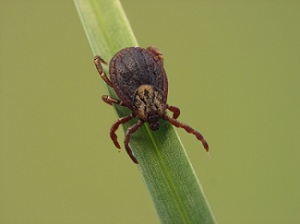
It seems impossible to find a “tick-free” region these days. Ticks are becoming common in areas of the USA and Canada that were once relatively safe. Because of the prevalence of these little creatures, it’s important to be aware of tick bites, and know how they can be treated. As a basic routine, you should follow these steps to reduce the chances of tick-borne disease from a bite (this is especially important if your dog spends a lot of time outdoors):
• Check your dog every day for attached ticks
• If you find a tick, remove it immediately
• When visiting your veterinarian, request a tick check during your wellness exam
• Discuss options for preventatives with your veterinarian
About treatments and preventatives:
There are different options you can choose to treat or prevent tick bites on your dog. (Disclaimer: Discuss ANY treatment or preventative with your veterinarian before using it on your dog – especially if you also have cats in your household. Cats can be extremely sensitive to many chemicals, including tick treatments.)
Pharmaceuticals exist to repel ticks from your dog completely, which will prevent bite wounds and the potential for the infections that could result, and have the added benefit of preventing tickborne disease. These preventatives, however, don’t have the advantage of killing the ticks, so they’ll continue to thrive and have the potential to bite you or someone else’s dog.
Another option is a treatment that would kill the tick once it has attached itself to your dog. These treatments do help reduce tickborne disease, and work to reduce the number of ticks in the environment, but have the disadvantage of allowing a painful bite on your dog that could cause an infection, and if the tick doesn’t die quickly, could still allow a tickborne disease to be transmitted.
Choosing the right option for you and your dog can be difficult. Your veterinarian has the experience and information to help steer you in the right direction and keep your dog healthy and safe!
Written by LifeLearn/MyPetED.com.
Caution: These news items, written by LifeLearn Inc., are licensed to this practice for the personal use of our clients. Any copying, printing or further distribution is prohibited without the express written permission of LifeLearn Inc. Please note that the news information presented here is NOT a substitute for a proper consultation and/or clinical examination of your pet by your clinic veterinarian.
